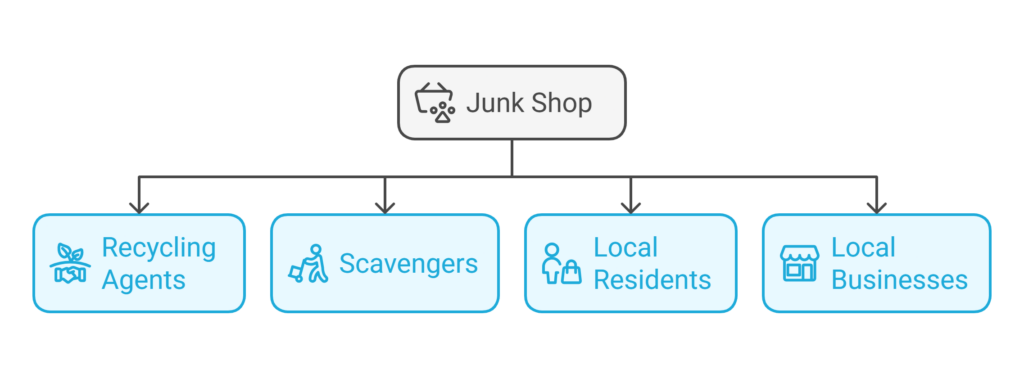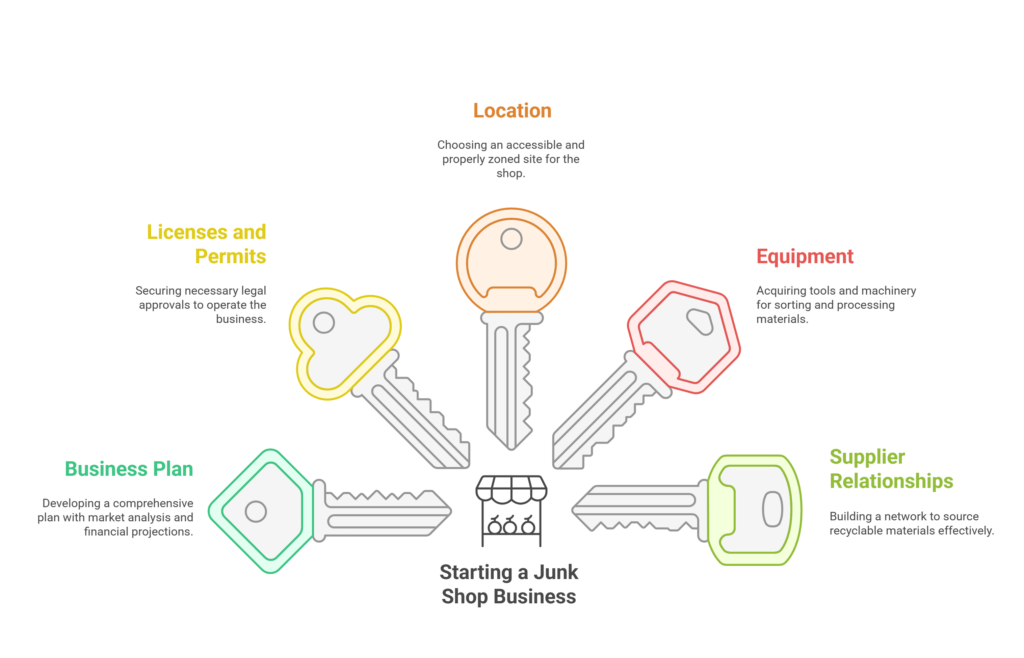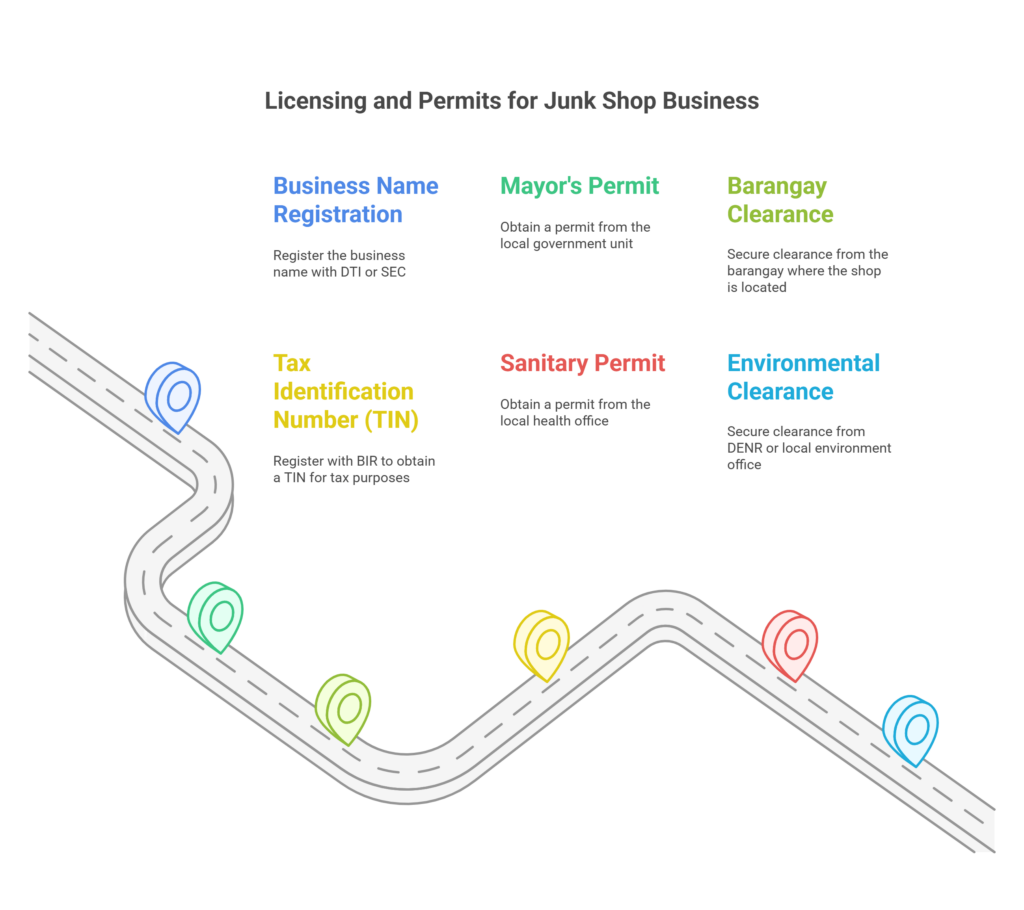Last updated on March 13th, 2025 at 10:34 am
The junk shop business in the Philippines is a lucrative industry that plays a crucial role in the country’s solid waste management and recycling efforts.
While sometimes perceived negatively due to its association with discarded and unclean materials, it is a stable business opportunity, immune to fads or trends.
This report provides a comprehensive overview of the junk shop business in the Philippines, covering various aspects such as:
- The types of items sold
- Target market
- Profit margins
- Regulatory environment
- Competitive landscape
- Challenges, and opportunities.
I have also included information on starting and running a junk shop business, including the necessary licenses and permits, and the capital required.
Existing Junk Shops in the Philippines
Before we look at the details of the junk shop business, let’s look at some examples of existing junk shops in the Philippines:
| Site | Location | Details |
|---|---|---|
| SGP Junk Shop and General Merchandise | Mandaluyong City, Metro Manila | Buys all kinds of scrap, steel, aluminum, and junk cars. |
| Alexander Ocag Junkshop | Baseco Happy Land and Aroma, Metro Manila | Buys sorted clean plastic for 15 pesos a kilo. |
| Kenkim’s Recycling Junkshop | Davao City, Mindanao | Wholesale scrap trading company specializing in various scrap materials. |
| V and C Junk Shop | Consolacion, Central Visayas | No details available. |
| Myrna Ignacio Junk Shop | Cebu City, Central Visayas | No details available. |
Types of Items Sold in Junk Shops
Junk shops in the Philippines buy and sell various recyclable materials.
These materials are usually sourced from individuals, households, and businesses looking to dispose of unwanted items.
Some of the most common items sold in junk shops include:
| Material Category | Material Type | Buying Price (₱/kg) | Selling Price (₱/kg) |
|---|---|---|---|
| Papers | Old newspapers, periodicals, other newsprints | 4.50 | 5.00 – 5.50 |
| Bond Paper (white) | 7.00 | 7.50 – 8.50 | |
| Carton and Cardboards | 2.00 | 2.50 | |
| Glass Bottles | Beer, softdrinks, selected hard liquor, soy sauce, fish sauce, etc. | 1.00 | 2.00 |
| Metals | Copper (red) | 140.00 | 150.00 |
| Copper (yellow) | 90.00 | 105.00 | |
| Aluminum | 35.00 | 40.00 | |
| Aluminum (jalousey framing) | 45.00 | 50.00 | |
| Aluminum cans | 25.00 | 35.00 | |
| Aluminum bottle caps | 10.00 | 20.00 | |
| Zinc | 10.00 | 20.00 |
But understand this, different types of materials have different buying and selling prices, as illustrated in the table above.
The specific types of items accepted by a junk shop may vary depending on the size and location of the business, as well as the demand for certain materials in the local market.
In addition to the materials listed above, junk shops may also accept electronics such as computers and batteries and automotive parts like junk cars and car batteries.
Junk Shop Business Target Market
Junk shops in the Philippines cater to a diverse target market, including:

- Recycling agents: These are companies that purchase recyclable materials from junk shops for further processing and manufacturing. Junk shop owners need to establish relationships with recycling agents to ensure a steady market for their collected materials.
- Scavengers: Individuals who collect recyclable materials from households and businesses and sell them to junk shops. Scavengers play a vital role in the recycling chain by providing a consistent supply of materials.
- Local residents: Individuals and households looking to dispose of unwanted items or purchase used goods at affordable prices.
- Local businesses: Small businesses and establishments that generate recyclable waste, such as offices, restaurants, and retail stores.
If you are thinking about starting a junk shop business, you must do further investigation to gain a deeper understanding of the target market and tailor marketing strategies accordingly.
In addition to the target markets listed above, it’s important to acknowledge the role of women in the junk shop business.
While they currently make up only a third of junk shop owners in the Philippines, there are initiatives aimed at empowering women in this industry.
For example, USAID has been working with local partners to provide skills training and seed capital to women waste collectors and recyclers, helping them move up the recycling value chain and improve their livelihoods.
Junk Shop Business Profit Margins
As you can guess, profit margin is a key indicator of a business’s financial health.
It represents the percentage of revenue that remains as profit after deducting the cost of goods sold, operating expenses, and taxes.
In general, a good net profit margin for a small business is considered to be above 10%, with 20% being considered high.
However, I couldn’t really get specific data on profit margins for junk shops in the Philippines.
But I am willing to be it is within the industry averages, or slightly above.
See, junk shops typically generate revenue by purchasing recyclable materials at low prices from scavengers and local residents and then selling them at higher prices to recycling agents.
The profit margin is the difference between the buying and selling prices, minus the operating costs of the business.
I would have loved to find some information on the most profitable items to sell in a junk shop business.
If you do have some ideas, share them with us in the comments section.
Either way, to maximize profitability, junk shop owners need to:
- Negotiate favorable prices: Bargaining with both suppliers and buyers to secure the best possible deals.
- Optimize operations: Efficiently sort, segregate, and process materials to minimize costs and maximize the value of the materials.
- Identify high-value materials: Focus on collecting and selling materials with higher demand and profit margins.
Regulatory Environment
The regulatory environment for junk shops in the Philippines is governed by various laws and regulations aimed at promoting proper waste management and environmental protection.
The overarching law is Republic Act 9003, also known as the Ecological Solid Waste Management Act of 2000.
This law mandates that local government units implement comprehensive and environmentally sound solid waste management programs.
These programs should prioritize waste reduction, reuse, and recycling, with junk shops playing a key role in achieving these goals.
Furthermore, junk shops have the potential to complement existing solid waste management laws and contribute to extended producer responsibility programs.
And if you can actively participate in these initiatives, your junk shop business can strengthen its position as a valuable partner in the waste management ecosystem.
In addition to the national law, cities and municipalities may have specific ordinances regulating the operation of junk shops.
These ordinances may include requirements for licenses, permits, and environmental compliance.
For instance, some local governments require junk shops to sign an agreement with the Business Permits and Licensing Office, ensuring they operate in a manner that does not cause nuisance to the neighborhood, obstruct traffic, or violate sanitation standards.
But get this, there is a lack of standard regulations for junk shop operations in some LGUs.
This inconsistency can create challenges for businesses and highlights the need for clearer guidelines and standards across different localities.
Read also: Top 10 Door-to-Door Delivery Services in the Philippines
Competitive Landscape
The competitive landscape for junk shops in the Philippines is characterized by a large number of small and medium-sized enterprises (SMEs).
The industry is highly fragmented, with no single player dominating the market. This fragmentation creates a competitive environment where businesses need to differentiate themselves to attract customers and suppliers.
Competition among junk shops can be intense, especially in urban areas with a high concentration of businesses. Some of the key factors that influence competition include:
- Pricing: Offering competitive buying and selling prices to attract suppliers and buyers.
- Location: Choosing a strategic location that is accessible to both suppliers and buyers.
- Service quality: Providing efficient and reliable service, including prompt payment and timely delivery.
- Relationships: Building strong relationships with suppliers and buyers to ensure a steady flow of materials and sales.
In addition to these factors, the circular economy and consumer acceptance in East and Southeast Asia play a significant role in shaping the competitive landscape.
As consumers become more aware of the environmental impact of their consumption habits, there is a growing demand for recycled and sustainable products.
This trend creates opportunities for junk shops to position themselves as key players in the circular economy by providing a reliable source of recyclable materials.
Junk Shop Business Challenges and Opportunities
Junk shops in the Philippines face various challenges, including:
- Fluctuating market prices: The prices of recyclable materials can be volatile, impacting profit margins.
- Competition: Intense competition from other junk shops and recycling businesses.
- Environmental regulations: Compliance with environmental regulations can be costly and challenging.
- Economic conditions: Economic downturns can affect the demand for recyclable materials and the profitability of junk shops.
- Child labor: The issue of child labor in junk shops is a serious concern that needs to be addressed.
Despite these challenges, the junk shop business also presents several opportunities:
- Growing demand for recycled materials: Increasing awareness of environmental issues and the importance of recycling is driving demand for recycled materials.
- Government support: The Philippine government is actively promoting recycling and providing support to businesses involved in waste management.
- Technological advancements: New technologies are emerging that can improve the efficiency and profitability of junk shop operations.
- Social responsibility: Junk shops play a vital role in reducing waste and protecting the environment, contributing to sustainable development.
- Sustainable development goals: Junk shops have the potential to contribute to various sustainable development goals, such as poverty reduction, good health and well-being, and decent work.
To further illustrate the challenges in the waste management sector, it’s worth considering the situation in Iraq.
The country’s solid waste management system faces significant challenges due to inadequate infrastructure, insufficient regulatory frameworks, and low public awareness.
This example highlights the importance of a well-functioning waste management system and the role of junk shops in contributing to a more sustainable approach.
How To Start and Run a Profitable Junk Shop Business

Starting a junk shop business in the Philippines involves several key steps:
- Develop a business plan: This should include a market analysis, financial projections, and operational strategies.
- Secure necessary licenses and permits: Register the business with the DTI, BIR, and LGU.
- Secure a suitable location: Choose a location that is accessible, properly zoned, and has adequate space for storage and processing.
- Acquire equipment: Invest in weighing scales, tools, and other equipment for sorting and processing materials.
- Build relationships with suppliers: Establish connections with scavengers, local residents, and businesses to source recyclable materials. This includes actively seeking new suppliers and not solely relying on walk-in sellers.
- Implement marketing strategies: Promote the business through online and offline channels to attract customers.
- Offer competitive pricing: Set buying and selling prices that are competitive and profitable.
Running a successful junk shop business requires:
- Efficient operations: Streamline processes for collecting, sorting, and processing materials.
- Inventory management: Maintain accurate records of inventory to avoid pilferage and ensure efficient stock rotation. This includes implementing a walk-in procedure to track the flow of materials.
- Financial management: Track income and expenses, manage cash flow, and reinvest profits to grow the business.
- Compliance: Adhere to environmental regulations and maintain a safe and clean working environment.
- Customer service: Build strong relationships with customers by providing reliable service and fair prices.
- Supplier relationships: Coordinate with recycling agents regarding payment schedules and volume of deliveries to maintain a smooth and reliable trading process.
To succeed in the scrap trading business, entrepreneurs should also consider the following requirements:
- Sufficient capital: Secure enough capital for purchasing scraps, renting space, and covering operational expenses.
- Knowledge of scrap materials: Gain a thorough understanding of the different types of scrap materials, their value, and their market demand.
- Suitable location: Choose a location that is accessible to suppliers and buyers, and has adequate space for storage and processing.
- Business registration and permits: Ensure compliance with all legal requirements by obtaining the necessary business registrations and permits.
- Reliable buyers: Establish relationships with reliable buyers who offer competitive prices for scrap materials.
- Pricing knowledge: Stay informed about the current buying and selling prices of scrap materials to make informed trading decisions.
- Proper equipment: Invest in essential equipment such as weighing scales and a delivery vehicle to facilitate operations.
- Thorough business knowledge: Acquire a comprehensive understanding of the junk shop business, including operational procedures, market dynamics, and financial management.
Junk Shop Business Licenses and Permits

To operate legally, junk shop businesses in the Philippines need to obtain the following licenses and permits:
- Business Name Registration: Register the business name with the DTI for sole proprietorships or the Securities and Exchange Commission (SEC) for partnerships and corporations.
- Mayor’s Permit: Obtain a mayor’s permit from the local government unit where the business will operate.
- Barangay Clearance: Secure a barangay clearance from the barangay where the junk shop is located.
- Tax Identification Number (TIN): Register with the Bureau of Internal Revenue (BIR) to obtain a TIN for tax purposes.
- Sanitary Permit: Obtain a sanitary permit from the local health office to ensure compliance with health and sanitation standards.
- Environmental Clearance: Secure an environmental clearance from the Department of Environment and Natural Resources (DENR) or the local environment office to ensure compliance with environmental regulations.
Capital Required To Start a Junk Shop Business in the Philippines
The capital required to start a junk shop business in the Philippines can vary depending on the scale of the operation and the type of materials being traded. A minimum starting capital investment of ₱100,000 is generally recommended. However, some sources suggest a higher initial capital investment of ₱150,000 or even ₱200,000, especially if the business requires significant improvements to the location or the purchase of a delivery vehicle.
The capital investment will cover expenses such as:
- Business licenses and registrations: Fees for registering the business with various government agencies.
- Security and rental deposit: If the business space is leased, a security deposit and advance rental payment may be required.
- Operating equipment: Weighing scales, pushcarts, tools, and other necessary equipment.
- Vehicle: A pick-up truck may be optional but can be helpful for transporting materials.
- Renovation: If the leased space requires renovation, this cost should be factored in.
- Revolving fund: Cash for purchasing recyclable materials from suppliers.
- Labor cost: Wages for employees, if any.
Final Thoughts
The junk shop business in the Philippines presents a compelling opportunity for entrepreneurs seeking to contribute to environmental sustainability while generating income.
And the industry is characterized by a large number of small and medium-sized enterprises, creating a competitive landscape where businesses need to differentiate themselves through pricing, location, service quality, and strong relationships with suppliers and buyers.
Junk shops play a crucial role in the country’s solid waste management and recycling efforts.
They collect and process a wide range of recyclable materials, including paper, plastic, metals, glass, and electronics, diverting waste from landfills and contributing to a circular economy.
Starting a junk shop business involves several key steps, including
- developing a business plan
- securing licenses and permits
- acquiring a suitable location and equipment
- building relationships with suppliers, and
- implementing effective marketing strategies.
On the other hand, running a successful junk shop requires efficient operations, inventory management, financial management, compliance with regulations, and a strong focus on customer service.
While the junk shop business faces challenges such as fluctuating market prices, intense competition, and environmental regulations, it also offers significant opportunities.
The growing demand for recycled materials, government support for recycling initiatives, and the potential to contribute to sustainable development goals make the junk shop business a promising venture for aspiring entrepreneurs.
Read also:
 Web HostingCost-effective shared hosting solutions
Web HostingCost-effective shared hosting solutions Reseller HostingStart your own hosting business without tech hustle
Reseller HostingStart your own hosting business without tech hustle Affiliate ProgramEarn commission by referring customers to our platforms
Affiliate ProgramEarn commission by referring customers to our platforms cPanel HostingHosting powered by cPanel (Mostly user friendly)
cPanel HostingHosting powered by cPanel (Mostly user friendly) Windows HostingOptimized for windows based-applications and sites
Windows HostingOptimized for windows based-applications and sites Domain SearchFind and register available domain names in seconds
Domain SearchFind and register available domain names in seconds All DomainsExplore and register domain extensions across the world
All DomainsExplore and register domain extensions across the world Domain Transfermove your domain to us with zero downtime and full control
Domain Transfermove your domain to us with zero downtime and full control Whois LookupLook up domain ownership, expiry dates and registrar information
Whois LookupLook up domain ownership, expiry dates and registrar information .com DomainSecure the most recognized domain for global credibility
.com DomainSecure the most recognized domain for global credibility VPS HostingScalable virtual servers. Full root access. Faster speed.
VPS HostingScalable virtual servers. Full root access. Faster speed. Managed VPSNot a tech expert? Choose our fully managed VPS server.
Managed VPSNot a tech expert? Choose our fully managed VPS server. Dedicated ServersGet the full power and complete control of your own physical server.
Dedicated ServersGet the full power and complete control of your own physical server.
